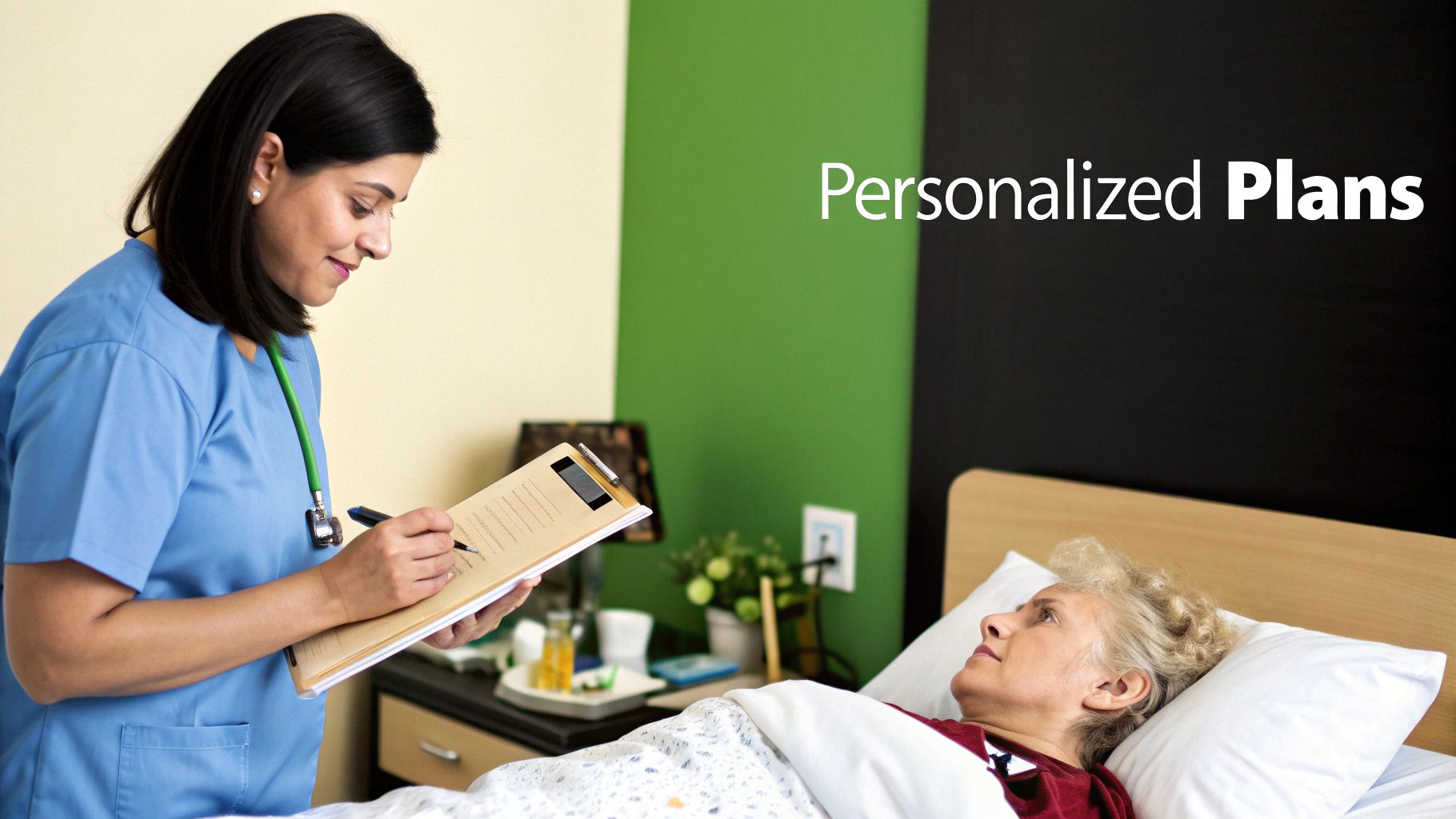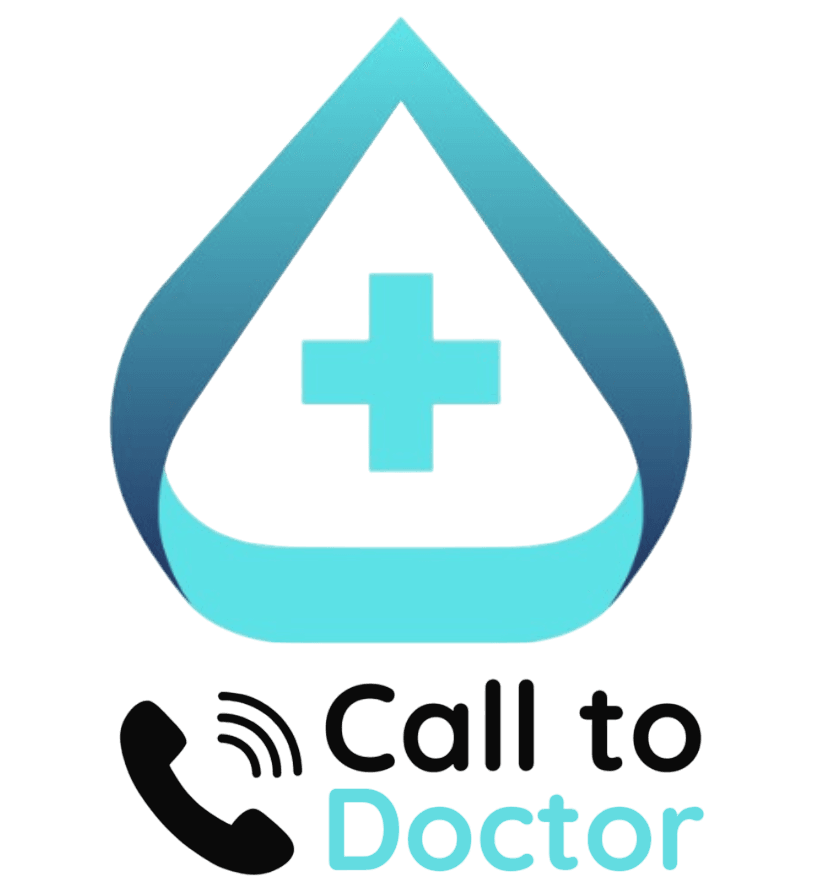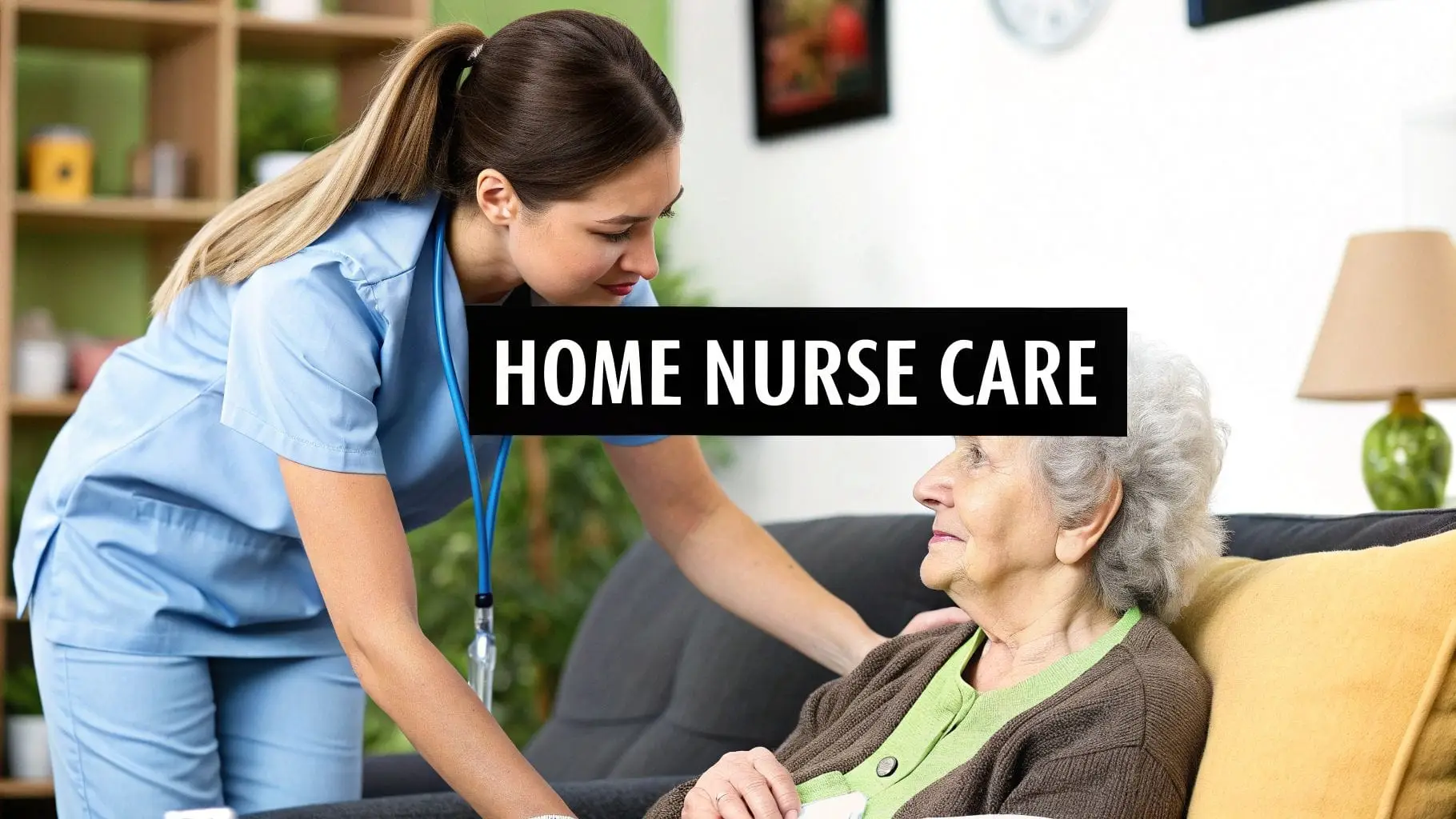When you need professional medical support, nurse services at home bring a skilled healthcare expert directly to your door. This essential service delivers the clinical expertise of a registered nurse to a familiar, comfortable environment, handling everything from post-surgery recovery to the management of long-term health conditions. It effectively transforms your home into a private, personalised space for healing and wellness.
What Are Nurse Services at Home Really Like?
Imagine a dedicated health professional managing complex medical needs right where you feel most at ease. That’s the core of professional nurse services at home. It goes far beyond basic assistance; it's the delivery of skilled clinical care that was once only available in a hospital setting.
This modern approach makes a home a safe and effective place for healing and managing long-term health. Think of it as building a bridge between the high-level care of a hospital and the emotional comfort of your own bed. This model of care is becoming increasingly vital in the UAE and around the world.
A Shift Towards Personalized Home Healthcare
The demand for medical support at home is rising rapidly. Globally, the home healthcare industry is expanding, with experts forecasting an annual growth of around 7.9%. This trend is largely driven by aging populations and an increase in people living with chronic illnesses—two significant factors in the UAE.
However, this isn't just about convenience. It's about delivering truly effective, personalized care that is built around a patient's specific health needs and circumstances.
A dedicated home nurse does more than administer medication or change a bandage. They become a trusted partner in a patient's health journey, providing peace of mind to families and ensuring a level of consistent, one-on-one care that is often hard to find in a busy hospital.
The Role of an At-Home Nurse
So, what does a home nurse actually do? Their responsibilities are comprehensive and always tailored to what an individual needs to recover or manage their health. Some of the most common areas of support from nurse services at home include:
- Post-Operative Recovery: Helping patients heal safely after surgery. This involves professional wound care, effective pain management, and offering mobility support to ensure a smooth recovery process.
- Chronic Disease Management: Supporting individuals with conditions like diabetes, COPD, or heart disease. This means helping them manage symptoms, take the correct medications on time, and monitor vital signs closely.
- Elderly Support: Providing specialised medical attention for seniors, focusing on their unique health challenges while helping them maintain as much independence as possible in their own home.
By bringing these crucial services into the home, patients receive focused, one-on-one attention. To get a better sense of everything involved, you can explore our detailed overview of what a nurse home service includes.
The Full Spectrum of In-Home Nursing Care
When you hear about nurse services at home, it’s easy to picture just one thing. But in reality, it's a wide spectrum of medical support, carefully scaled to fit a patient's exact situation. Think of it less like a one-size-fits-all service and more like a flexible healthcare solution that adapts to different stages of life and health.
The care available ranges from foundational monitoring to advanced medical procedures. This layered approach ensures that whether someone needs simple monitoring or requires complex clinical treatment, they can receive it in the comfort of their own home.
Foundational Nursing Support
At its core, in-home nursing often begins with the essentials: monitoring and management. This foundational level of care is crucial for maintaining stability and preventing complications, especially for individuals with chronic conditions or those beginning their recovery journey. It’s that consistent, watchful eye that brings incredible peace of mind to patients and their families.
These fundamental services are the building blocks of any effective home care plan:
- Medication Management: A registered nurse ensures all prescribed medications are taken correctly and on schedule, preventing dangerous mix-ups or missed doses. This is a critical service for patients with complex medication regimens.
- Vital Signs Monitoring: This involves the regular checking of blood pressure, heart rate, temperature, and respiration. Keeping a close eye on these metrics helps catch potential health issues before they escalate into serious problems.
- Basic Health Assessments: Nurses perform routine check-ups to evaluate a patient's overall condition, listen to any concerns, and provide clear updates to the primary physician.
To give you a clearer picture, here’s a quick breakdown of some common services.
Common At-Home Nursing Services at a Glance
| Service Type | What It Involves | Who It Helps Most |
|---|---|---|
| Post-Surgical Care | Wound dressing changes, pain management, monitoring for infection, and assistance with mobility. | Patients recovering from major operations like joint replacements or cardiac surgery. |
| Chronic Disease Management | Regular monitoring of conditions like diabetes or hypertension, administering insulin, and providing patient education. | Individuals living with long-term health conditions that require consistent medical oversight. |
| IV Therapy & Injections | Administering fluids, medications, or nutrients through an IV line or giving necessary injections. | Patients requiring hydration, antibiotics, or regular shots for conditions like B12 deficiency. |
| Palliative Care | Focusing on comfort and quality of life by managing pain and other symptoms of serious illness. | People with life-limiting conditions who want to maximize their comfort at home. |
This table just scratches the surface, but it demonstrates the adaptability of professional home nursing.
Advancing to Skilled Medical Care
When a patient’s needs become more complex, the level of care from nurse services at home elevates accordingly. This is where a registered nurse’s clinical skills are indispensable, allowing for procedures once confined to a hospital to be performed safely at home.
For example, someone recovering from major surgery requires more than just basic assistance. A home nurse can manage their entire post-operative plan, providing specialized wound care to prevent infections and promote faster healing. This kind of one-on-one attention is often the key to a quicker, safer recovery.
"I received the same level of care at home as I did in the hospital, and it was much more comfortable. I was much happier to be at home. It is always better to be at home than in a hospital if you have the choice.”
This sentiment from a patient highlights the powerful impact a familiar environment has on healing.
This image below beautifully illustrates how home nursing blends professional care with the comfort of familiar surroundings.

It’s a great reminder that bringing skilled medical support into the home is about combining clinical excellence with emotional well-being.
Specialised and High-Level Interventions
Beyond recovery and monitoring, nurse services at home also cover highly specialized medical tasks. These services are a lifeline for individuals with significant health challenges, allowing them to manage their conditions without constant trips to and from the hospital.
- Intravenous (IV) Therapy: Administering medications, hydration, or nutrition directly into the bloodstream.
- Injection Administration: Handling regular injections for conditions like diabetes or other specific treatments.
- Catheter and Ostomy Care: Managing and maintaining catheters or ostomy bags with clinical precision to ensure hygiene and prevent complications.
- Palliative and End-of-Life Care: Offering compassionate support focused on comfort and quality of life.
This wide range of care is particularly crucial for the elderly, who often juggle multiple health needs. It’s important to understand the difference between general support and skilled nursing; our guide on choosing between carers for elderly and nurses offers a much deeper look.
Why Home Nursing Is a Better Choice for Recovery

Deciding between recovering in a hospital or at home is a significant choice. While hospitals are equipped for intensive medical needs, there is something powerful about healing in your own space. The benefits of receiving nurse services at home extend far beyond convenience, often making it the superior choice for a person’s overall well-being and recovery speed.
True healing involves both the body and mind. The comfort of your own bed, surrounded by familiar photos and loved ones, creates a peaceful, low-stress environment. This sense of calm has been shown to lower anxiety and contribute to better health outcomes simply because people feel more relaxed and in control.
Personalised Attention and Faster Healing
In a busy hospital, a nurse's attention is divided among many patients. With home nursing, that focus is entirely on one person. This one-on-one dynamic means that even subtle changes in a patient's condition are noticed and addressed immediately, which can prevent small issues from becoming major complications.
This dedicated care allows a nurse to build a strong rapport with the patient, understanding their unique needs and preferences. Such personalized support can make a huge difference in the speed and comfort of recovery. For example, a home nurse can time mobility exercises or pain medication to fit a patient's natural rhythm, truly optimizing their healing journey. This is particularly true for specialized care, a topic we explore in our guide on physiotherapy at home.
Reduced Risks and Improved Safety
Hospitals, despite stringent cleaning protocols, are environments where infections can spread. For someone with a compromised immune system, this poses a serious risk. Recovering at home dramatically reduces exposure to these hospital-acquired infections (HAIs), creating a much safer healing environment.
Beyond germs, a home nurse also helps manage the living space to prevent falls and other accidents, ensuring the environment itself is optimized for a safe recovery. This proactive focus on safety is a cornerstone of quality nurse services at home.
One of the biggest advantages of recovering at home is the significant reduction in stress and anxiety. Healing in a familiar place, away from the constant noise and interruptions of a hospital ward, allows the body and mind to rest properly—an absolutely vital component of a swift recovery.
This move toward community and home-based care is a growing global trend. In the UAE, there is a clear strategic push to expand these services to improve quality of life and reduce the strain on hospitals. As a result, more seniors are choosing to manage post-operative and long-term care from home. You can explore more insights on this growing market on coherentmarketinsights.com.
How to Choose the Right Home Nursing Provider in the UAE
Finding the right provider for nurse services at home can feel daunting, but it doesn’t have to be. By focusing on a few key areas, you can confidently select a service that delivers safety, quality care, and complete peace of mind. Think of it less like hiring a service and more like building a partnership with a team you can trust with a loved one's health.
The first and most critical step is verifying credentials. In the UAE, any legitimate home healthcare agency must be licensed by the appropriate health authority, such as the Dubai Health Authority (DHA) or the Department of Health – Abu Dhabi (DOH). This license is non-negotiable and serves as your proof that the provider meets strict standards for safety and quality.
Beyond the agency's license, inquire about the nursing staff's qualifications. A reputable provider will be transparent about their team's credentials, confirming that all nurses are registered and have the specific qualifications for the nurse services at home they provide.
Key Questions for Your Consultation
Once you have a shortlist of licensed providers, schedule a consultation. This is your opportunity to dig deeper and understand their operational standards. Having a list of questions prepared will help you make a well-informed decision.
You'll want to ask about their specific protocols and how they handle different scenarios:
- Emergency Procedures: "What is your protocol if a medical emergency occurs at home?"
- Family Communication: "How do you keep us informed about our loved one's condition and progress?"
- Care Plan Development: "Can you walk me through your process for creating and updating a personalized care plan?"
- Staffing Consistency: "Can we expect the same nurse for each visit to ensure continuity of care and build a consistent relationship?"
These questions get to the heart of the matter and reveal how organized and patient-focused the provider truly is.
A provider's true value lies not just in their clinical skills, but in their commitment to clear communication and collaboration. A great home nursing service works with the family, not just for the patient, creating a supportive network that benefits everyone involved.
Evaluating the Provider's Approach to Care
Finally, evaluate the provider’s overall approach to healthcare. Do they focus on creating a custom care plan based on a person's unique medical needs, or do they offer a more generic service? The best providers always begin with a comprehensive assessment to understand the patient’s health history, current condition, and personal preferences before any care starts.
This dedication to personalized care is a hallmark of excellence. For a closer look at what top-tier service entails, you can learn more about the standards for home nurses in Dubai and what to expect from a leading provider. Ultimately, choosing the right provider means finding a team that is not only clinically skilled but also compassionate and communicative, ensuring your loved one receives the best possible care.
Navigating Costs and Insurance for Home Care
Understanding the financial aspects of professional care is a critical step when arranging for nurse services at home. While the costs may seem complex at first, they are typically broken down by clear, understandable factors. Addressing this early is key to establishing sustainable, long-term care without unexpected financial strain.
The final cost is shaped by the specific level of medical support your loved one requires. For instance, basic assistance with daily medication and health monitoring will have a different price point than more intensive care, such as post-surgery wound management or specialized IV therapy.
Understanding the Key Cost Factors
Several key elements directly influence the overall expense of home nursing care in the UAE. The most significant factor is the intensity and type of medical care required. A patient who needs a registered nurse on-site around the clock will have a different budget than someone who only needs a nurse for a few hours per week.
Other major factors include:
- Frequency and Duration of Visits: Whether care is needed daily, weekly, or on a 24/7 basis. The total number of hours is a core component of the final calculation.
- Nurse's Qualifications: The cost can vary depending on whether the situation requires a Licensed Practical Nurse (LPN) or a more highly qualified Registered Nurse (RN).
- Specialized Equipment: If the care plan involves medical equipment like ventilators, IV pumps, or specific wound care supplies, these costs will also be factored into the pricing.
This structured approach ensures you only pay for the precise level of support needed.
Exploring Insurance Coverage in the UAE
A common question is whether health insurance covers nurse services at home. In the UAE, coverage depends heavily on your insurance provider and the specifics of your policy. While many basic plans may not include home nursing, a significant number of enhanced or premium policies do, especially when it's for post-hospitalization recovery or chronic condition management.
The best course of action is to be proactive. Contact your insurance provider directly to inquire about your plan's details. You should understand their pre-approval process, any co-payment requirements, and the documentation needed to submit a claim. Clarifying these points upfront will make financial planning much smoother. Sometimes, combining home nursing with other services, like a home doctor visit in Dubai, can create a more comprehensive care package that insurers may view more favorably.
The home healthcare market is a major part of the regional economy. In the Asia Pacific region, including the UAE, the market generated revenues exceeding USD 79 billion by 2024. The 'services' segment, primarily driven by nursing care, constitutes the largest portion. This reflects a significant reliance on professional care at home, a trend fueled by the needs of an aging population and a rise in chronic diseases. You can dive deeper into the numbers and discover more insights about this growing market on grandviewresearch.com.
Answering Your Key Questions About Home Nursing

Arranging for nurse services at home is a significant decision, and it’s natural to have questions. Feeling confident about the path forward comes from getting clear, straightforward answers. This section addresses the most common concerns families have, providing the insight needed to make the best choice.
We’ll explain how care plans are developed, the key differences between various types of home support, and what happens in a medical emergency. Each answer is designed to offer both information and peace of mind.
How Is a Personalised Care Plan Created and Updated?
A personalised care plan is the foundation of high-quality home nursing. The process begins with a thorough initial assessment conducted by a senior nurse or clinical supervisor. This is a comprehensive evaluation of your loved one's medical history, current health status, physician's orders, and personal routines and preferences.
From this assessment, a tailored plan is developed in collaboration with the patient, their family, and their primary doctor. This collaborative approach ensures everyone is aligned and the plan truly meets the individual's needs.
A care plan is not a static document; it's a dynamic guide that evolves with a person's health. The home nurse continuously monitors progress and communicates any developments to the supervisory team and family. Regular reassessments are also scheduled to formally update the plan, ensuring the care provided always remains appropriate and effective.
What Is the Real Difference Between a Registered Nurse and a Caregiver?
This is a crucial question, as these two roles serve different yet equally important functions. The simplest distinction is that a caregiver provides non-medical support, while a Registered Nurse (RN) delivers skilled medical care.
- A Caregiver helps with activities of daily living (ADLs). This includes bathing, dressing, meal preparation, and providing companionship. They are essential for keeping someone safe and comfortable at home but are not licensed to perform clinical tasks.
- A Registered Nurse (RN) is a licensed medical professional. They are qualified to administer medications, provide wound care, manage IV therapy, conduct health assessments, and operate complex medical equipment. Their focus is on the patient's clinical needs.
The choice between the two depends entirely on the type of support required. If the primary need is for medical treatment and close health monitoring, a Registered Nurse is essential. If the focus is on personal assistance and companionship, a caregiver is the appropriate choice. Many families find that a combination of both provides the most comprehensive support.
What Happens If There Is a Medical Emergency at Home?
This is, understandably, a major concern for most families. Any reputable provider of nurse services at home will have clear and rehearsed emergency protocols. The top priority is always the patient's immediate safety. Your nurse is trained to rapidly assess the situation, provide immediate first aid or life support, and stabilize the patient.
Simultaneously, the nurse will contact emergency services (such as an ambulance) and the patient's primary doctor. They also play the vital role of communicating clearly with the family, keeping you informed every step of the way. Because the nurse has the patient's full medical history readily available, they can provide emergency responders with crucial information, ensuring a smooth and effective transfer of care. This structured response protocol ensures that even in a crisis, your loved one receives prompt, professional medical attention.
For trusted, professional, and compassionate nurse services at home in Dubai, Call To Doctor provides DHA-licensed nurses available 24/7. We bring expert medical care directly to you, ensuring your loved ones receive the highest standard of support in the comfort of their home. Learn more about our services and book a consultation today at https://calltodoctor.ae.



Leave a Reply